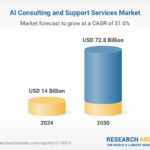Artificial intelligence is on the verge of fundamentally transforming the B2B payments landscape, bringing significant changes to finance operations, as predicted by Chris Couch, the Head of Product for B2B at payments provider Flywire.
AI Replacing Traditional Integrations
Couch envisions a future where traditional APIs, which have long served as essential connectors between business systems, are supplanted by AI agents capable of natively interpreting documents. By 2030, finance teams are expected to move away from lengthy integration projects, opting instead for AI systems that can autonomously extract data from invoices, contracts, and emails without the need for manual coding or rigid data formats. This shift represents a radical departure from current practices, enabling companies to utilize AI agents that can understand documents in any format almost instantaneously. Such advancements promise to make the processes of invoice processing and contract execution entirely self-service.
Shifting Focus: From Accuracy to Recovery
One significant change in finance teams will be the shift in priorities from accuracy to the speed of error recovery. While AI systems may not attain the same precision as human processors, Couch argues that the ability of AI to rectify mistakes almost instantly offers a stronger business case than striving for perfect accuracy. As these systems can process thousands of transactions in rapid succession, operational efficiency will take precedence over minor accuracy discrepancies. Chief Financial Officers (CFOs) are likely to concentrate more on how quickly AI solutions can identify and correct errors rather than just their overall accuracy statistics. The concept of the ‘Autonomy Tax’ will increasingly influence value calculations, weighing the costs associated with error correction against the benefits of speed improvements.
Evolution of Business Documents into Intelligent Agents
Another anticipated transformation involves the evolution of business documents into functioning software agents. In the next five years, the distinction between static invoices and dynamic programs is expected to diminish. These intelligent documents will not merely convey terms but will actively enforce them, initiating and negotiating follow-up actions as needed. Current AI language models are already parsing agreements and triggering workflows. Couch contends that the next logical step is for every business document to act as an agent itself. For instance, invoices could escalate if ignored, while contracts would autonomously detect and flag potential violations.
Transforming the Finance Workforce
The adoption of AI is poised to redefine roles within the finance workforce significantly. As automation takes over routine tasks, Couch predicts that finance professionals will fall into two primary categories: those who specialize in developing and advancing AI systems—teaching them business rules and exceptions—and those who will focus on higher-level decision-making tasks that remain beyond AI’s capabilities. Junior employees are likely to shift away from traditional career progression toward roles centered on AI training, while senior professionals will need to concentrate on strategic, risk-based decision-making as AI takes over mechanical accounting duties. The most valuable team members will be those who can encode complex requirements and ethical standards into these autonomous tools.
“Finance teams today are confusing ‘reliable’ with ‘refusing to evolve.’ Those too slow to adapt will see their current tech stack look like a museum exhibit by 2030,” said Chris Couch, Head of Product, B2B, Flywire.
Couch’s insights point to a rapidly evolving landscape in finance driven by advancements in AI. The move towards self-service processing, combined with intelligent document capabilities, is set to redefine how businesses manage payments and contracts. As the finance industry prepares for these changes, the emphasis will increasingly be on speed and adaptability in a world where AI plays an ever-growing role.
 Intuit Partners with OpenAI to Deliver Personalized Financial Advice through ChatGPT
Intuit Partners with OpenAI to Deliver Personalized Financial Advice through ChatGPT AI Adoption Reaches 70% in Businesses, Projected Market Growth to $72.8B by 2030
AI Adoption Reaches 70% in Businesses, Projected Market Growth to $72.8B by 2030 Maxima Secures $41M to Transform Accounting with Agentic AI Platform
Maxima Secures $41M to Transform Accounting with Agentic AI Platform Elon Musk Predicts Work Will Be Optional in 10-20 Years Due to AI and Robotics
Elon Musk Predicts Work Will Be Optional in 10-20 Years Due to AI and Robotics AI Adoption in Finance Lags as 95% of Projects Fail to Scale, Warns MIT Study
AI Adoption in Finance Lags as 95% of Projects Fail to Scale, Warns MIT Study



























































